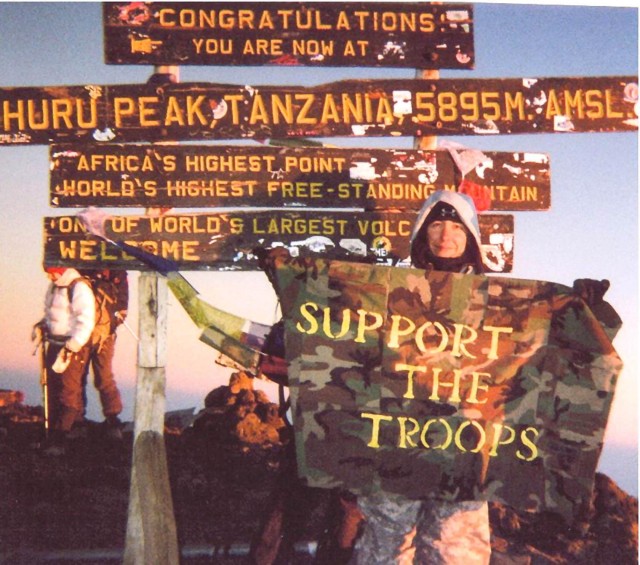FORT LEWIS, Wash. - Support the Troops signs are not unusual, but seeing someone holding that message on top of the highest peak in Africa is another story.
That's what Naomi Cheever, who works at the Northwest Adventure Center, did. She stood at the 19,340 foot summit of Mount Kilimanjaro, in Tanzania, Aug. 28, holding a Support the Troops flag.
Cheever first got the idea last summer to do the eight-day climb to honor her husband, Staff Sgt. Jacob Cheever, 3rd Squadron, 2nd Cavalry Regiment, who is in Iraq, and other deployed Soldiers. She returned to Fort Lewis from Vilseck, Germany, during her husband's deployment. She trained in the mountains here for her African climb.
"Most of the climb wasn't that difficult, but there were parts where it was hard to tell where the path was going," Cheever said. "At the end of the day, my body wasn't sore. The most challenging part of the climb was the summit day."
According to Cheever's daily account of the climb, however, the summit day sounded more than just "challenging" as she faced extreme cold, scaled large boulders and suffered from altitude sickness.
"I could have never understood how horrible it was going to be, and there was one point where I didn't know if I was going to make it," she said.
One thing that helped a lot was having a woman companion, Alexia Kazarian, from France, along on the climb, she said.
"When I was weak, she was there for me, and when she was weak, I was there for her," Cheever said.
It was so cold on the day of the summit that Cheever said she lost feeling in her toes and fingers had trouble gripping her trekking poles.
"I was wearing six pairs of pants, three shirts, two fleeces, a ski jacket, a knit hat, and a scarf, and I was still freezing and miserable," she said.
She also became nauseous as a result of altitude sickness.
"After a couple of hours of stopping to throw up," she said, "I decided to do the 'walk and toss.' I literally would be walking and just move my head to the side to vomit, while I continued to climb."
The altitude sickness continued for the first five hours of the summit climb, but Cheever refused to give up.
"Actually, at that point, I didn't have much choice," she said. "Nobody comes that far just to turn around, but just thinking about God, family and all of our troops were what motivated me to keep going."
The last two hours of the climb, Cheever started to feel better.
"I knew I could make it those last two hours because I had no headache, nothing," she said. "I felt about as good as anyone could feel after climbing that far."
Seven hours and 15 minutes after she set out, Cheever stood at the summit.
"The view was amazing," she said. "We got there at sunrise on a clear day, and we could see the glaciers all around. The scenery was majestic, and I was so ecstatic that I was able to get to the top of the mountain in honor of our deployed troops."
The best part was holding the flag at the top with the other climbers watching, she said.
Although Cheever had trained hard for the climb, she said there are many reasons some people make it to the top, while others don't.
"It partly has to do with your physical condition, but it also has to do with the climber's ability to acclimate to the altitude," she said. "I never did a climb like this before, and I knew I was getting out of my comfort zone, but what the Soldiers are doing is not comfortable. To honor them, I needed to make it difficult."
Cheever spent eight days on the mountain - six days on the ascent and two days descending.
"I can now say that I climbed to the summit of Mount Kilimanjaro, the highest peak in Africa," she said.
Volunteering in Africa
Following her successful climb to the top of Mount Kilimanjaro and back, Naomi Cheever stayed in Africa to volunteer at the Moshi Juvenile Detention Center.
While working there, Cheever stayed in the Moshi CCS Home for volunteers in Tanzania, Africa. She felt blessed to have an outstanding roommate, Elizabeth Ryan, from Nova Scotia, Canada.
"She inspired me every day, especially in my volunteer work," Cheever said. "Elizabeth is so much the reason I was able to survive in that home as a happy person."
Unfortunately, while Cheever was on a safari with Ryan and six other women, they were involved in a terrible vehicle accident. None of the girls was wearing a seat belt, and Ryan was killed instantly. Although all of the other five women survived, Cheever received some deep wounds.
Because of that unfortunate accident, Cheever's volunteer work was cut short, and she returned to Fort Lewis much earlier than she had originally planned, so that she could receive the medical care she needed.
Cheever will soon leave the Fort Lewis area to return to Vilseck, Germany, to meet her husband when he returns home from deployment in Iraq.
"The volunteer work I did in Africa was a life-changing experience for me," she said. "It was both the best time in my life and the worst time in my life, all in one month. I have met some of the most amazing people of my life there, and if I could, I would live there."
Barbara L. Sellers is a reporter with Fort Lewis' Northwest Guardian.


Social Sharing